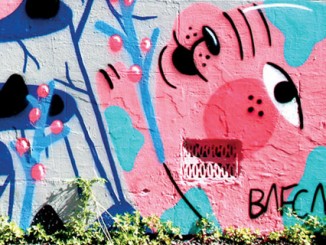Having an obvious disability often means that you stand out from the crowd, and not in a good way either. However, living in Newtown is definitely a plus in that regard – everyone stands out, thus everyone blends in. Still, I face prejudiced attitudes whenever I venture out in my neighbourhood.
As I was born with cerebral palsy I am largely used to people acting awkwardly around me. Therefore it’s not the sideways glances or the full-blown stares that unsettle me, it’s the way I get talked to and the way my opinions get dismissed. Even then I can’t blame individuals, it’s the narratives about physical and intellectual ability perpetuated in society that are to blame.
If you think about it, disability has the greatest presence in our community in a vague and symbolic form. Faceless white stick figures on a bright blue background are the quintessential representation of different ability in mainstream culture. There are numerous signs and symbols to display how accessible businesses and public spaces are to us, “disabled folk”. These signs can indicate whether a venue is wheelchair accessible or if it is equipped for the hard of hearing.
Tellingly, the vast majority of the general public ignore these signs. Trust me, I have been forced to precariously stand on public transport time after time, and generally buses are the worst. People with seemingly better sense of balance than me sit in the seats marked with the wobbly stick figures as I desperately grip on to a handle for dear life. I get it – those seats are more convenient and you don’t want to risk being awkwardly wedged between that guy with bad BO and the woman with her music up way too loud.
However, what you may not notice when you first glance at my awkward gait and wayward right arm is that I can’t speak naturally. If I want to ask people to move so I can get safely out at my desired stop, I have to type that request on my communication device or vaguely gesture.
If I do resort to gesturing, I need to hope that my request is seen as rational and then that it is heeded. So I sit in those disabled seats not only to mitigate my unreliable balance, but also as a way of avoiding this exchange
You see, communication disability isn’t on those accessibility signs and is thus out of most people’s understanding of what having a disability involves. Whenever I go to Black Star to get their lusted-after coffee and pastries, I have to type out that I am not actually deaf. Because if I don’t, the person serving me will talk with their eyes unnecessarily wide and may be even grab a pen and try to write the price out.
While these anxious moments of commotion are fun to watch, it quickly gets tiring constantly correcting people’s assumptions about my abilities and limitations – don’t even get me started on people who think I am stupid.
Words: Georgia Cranko, Vice President of ACC Voice. AAC Voice will be holding an awareness-raising picnic for alternative and augmentative communication on October 25th in Victoria Park.



Leave a Reply
You must be logged in to post a comment.